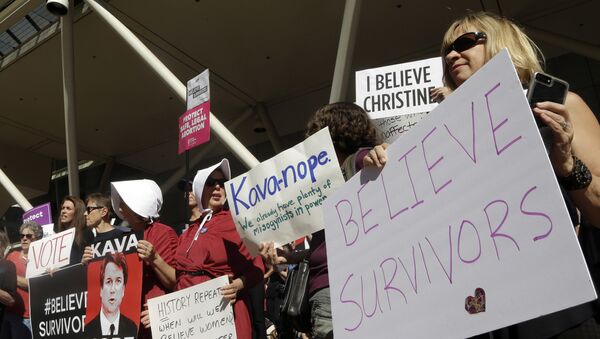"I thought that he acted like a nine-year-old having a temper tantrum," Heidi Boghosian, the executive director of the AJ Muste Memorial Institute and the former executive director of the National Lawyers Guild, told Radio Sputnik's Loud & Clear Friday. She helped create a legal defence fund for people targeted by the US government and authored "Spying on Democracy: Government Surveillance, Corporate Power, and Public Resistance."
"I looked up the American Bar Association's description of judicial temperament, and they say in part that a judge exhibits ‘compassion, decisiveness, open-mindedness, sensitivity,' and here's where it gets interesting," she said: "‘courtesy, patience, freedom from bias and commitment to equal justice.'"
However, she also noted that there are, curiously enough, no requirements to be a supreme court justice.
Boghosian noted that American Bar Association (ABA) wrote to Senator Chuck Grassley (R-IA), who chairs the Senate Judiciary Committee, asking that Kavanaugh's confirmation be delayed "until an appropriate background check into the allegations made by professor Ford and others is completed by the Federal Bureau of Investigation."
Nevertheless, the ABA rated Kavanaugh "well qualified" for the position of Supreme Court justice in its August 31 evaluation of his "integrity, professional competence and judicial temperament."
US Senator John Cornyn (R-TX), Senate majority whip, told reporters at the US Capitol following a meeting with Senate Majority Leader Mitch McConnell that Senate leaders have agreed to delay Kavanaugh's Supreme Court confirmation vote to allow for a one-week "supplemental background FBI investigation," Sputnik reported Friday.
The Senate Judiciary Committee, responsible for deciding whether Kavanaugh's nomination would move forward, further indicated in a Friday statement that the FBI investigation would be "limited to current credible allegations against the nominee." However, the group nonetheless voted 11-10 to hold a procedural vote Saturday at noon that will prepare the way for a final vote in the future on Kavanaugh's nomination, Sputnik reported.
Following the committee's announcement Friday afternoon, US President Donald Trump ordered the FBI to initiate such an investigation, noting that it must be limited in scope and not last more than one week.
Ford is one of four women to accuse Kavanaugh of sexual misconduct. She told the Senate committee Thursday that Kavanaugh tried to rape her during a party in 1982, when they were both in high school. She told senators that she was "terrified" but felt it was her "civic duty" to testify. She said she "agonized daily" over whether or not to come forward, fearing "my single voice would be drowned out."
Nonetheless, Ford was subjected to a brutal cross-examination that Boghosian told Sputnik on Thursday "was deposition-like, methodical… possibly to impugn the credibility in terms of the emotional impact that this experience had on professor Ford."
Boghosian noted Friday that Ford's testimony "resonated with hundreds of thousands of individuals across the country," recalling that the National Sexual Assault Hotline received "a record number of calls" on Thursday "from people who heard her and then had the courage to call for help."
"If you didn't believe the claims against [Kavanaugh], I thought the inability to control his temper, his visceral rage, against Senate Democrats; his non-answers; evasiveness; volatility; belligerence — I judge someone on how they behave in a Senate hearing. He got failing grades in my book," Boghosian said.




